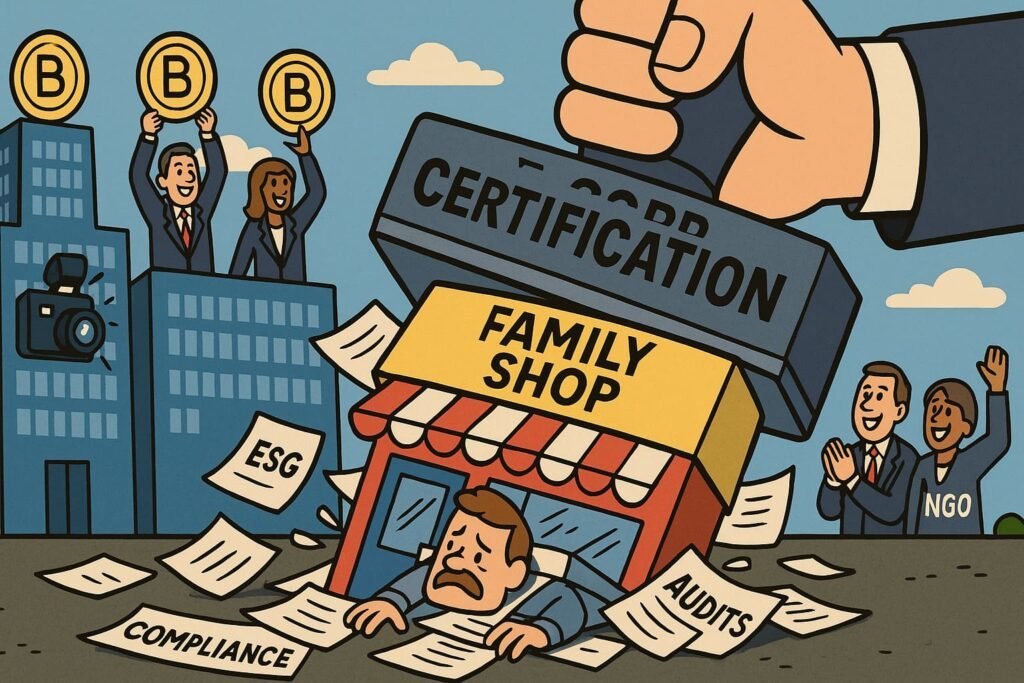B Corp Certification – The Corporate Trap for Small Businesses
Introduction: The Badge of Virtue, The Weight of Bureaucracy
B Corp Certification is sold as the gold standard for “responsible” business. The pitch is simple: balance profit with purpose, earn the badge, and show the world you care. For small businesses, it looks like a ticket to credibility.
But behind the glossy marketing lies a trap. B Corp is less about ethics and more about compliance. It lures small firms into costly audits, ESG-style reporting, and a maze of box-ticking bureaucracy. While big corporations wear the badge as cheap PR, small businesses are left drowning in paperwork and losing their independence.
Table of contents
- B Corp Certification – The Corporate Trap for Small Businesses
- Introduction: The Badge of Virtue, The Weight of Bureaucracy
- What is B Corp Certification?
- Why Small Businesses Fall Into the Trap
- Why Big Corporations Love B Corp
- From Voluntary Badge to Regulatory Trojan Horse
- The Costs for Small Firms
- Why It Matters
- Conclusion: The Badge That Costs Freedom
- FAQ: B Corp Certification and Small Businesses
What is B Corp Certification?
On paper, B Corp Certification proves a company meets high standards of social and environmental responsibility. To qualify, businesses must:
- Submit to an extensive audit of operations.
- Meet benchmarks on “social justice,” sustainability, and governance.
- Agree to legal changes in company structure to prioritise “purpose” alongside profit.
- Pay recurring certification fees.
It sounds noble. But in practice, it embeds businesses into the ESG (Environmental, Social, Governance) framework — the same model driving corporate woke branding and government “sustainability” regulation.
Why Small Businesses Fall Into the Trap
For a family-run business or start-up, B Corp offers three temptations:
- Branding appeal: The badge suggests virtue, which looks good to customers.
- Market access: Some contracts and supply chains increasingly prefer “certified” companies.
- Moral pressure: In a climate obsessed with “equity” and “inclusion,” not joining can feel like non-compliance.
But once inside, small businesses discover the cost: consultants, fees, staff time, and never-ending reporting requirements. Unlike big corporations, they can’t absorb those costs.
Why Big Corporations Love B Corp
Here’s the irony: the biggest beneficiaries of B Corp are not the small businesses who sign up. They are the corporate giants who:
- Can afford teams of lawyers and consultants to breeze through the process.
- Use the badge to market themselves as ethical while outsourcing real problems abroad.
- Enjoy free PR — B Corp looks like reform, but costs far less than raising wages or paying fair taxes.
For the big players, B Corp is just another logo to slap on their website. For small firms, it’s survival at stake.
From Voluntary Badge to Regulatory Trojan Horse
B Corp is pitched as voluntary, but once enough companies join, it becomes the Trojan horse for government overreach.
- Step 1: Activists and NGOs push for certifications like B Corp to become the “standard.”
- Step 2: Corporations adopt it to look progressive.
- Step 3: Governments step in, embedding these standards into law.
The line between voluntary compliance and mandatory regulation disappears. Small businesses who never signed up face pressure to follow the rules anyway, without the resources to cope.
The Costs for Small Firms
- Financial strain: Certification fees, consultant costs, and lost staff hours.
- Bureaucracy: Endless audits and ESG reporting systems designed for corporations, not family businesses.
- Loss of freedom: Legal commitments tie company decisions to vague concepts like “purpose” and “inclusion.”
- Competitive disadvantage: While big companies polish their image, small firms pay the real price.
The badge doesn’t level the playing field — it tilts it even further towards the corporate giants.
Why It Matters
B Corp is sold as ethical progress, but in reality it’s a pipeline: activist jargon → corporate branding → government regulation. Small businesses are the easiest to trap, the quickest to comply, and the first to drown under the costs.
This isn’t about justice. It’s about power.
Conclusion: The Badge That Costs Freedom
For small businesses, B Corp isn’t a badge of honour. It’s a badge of dependence.
What begins as a marketing boost quickly becomes a cage — tying firms into woke corporatism, endless audits, and compliance systems designed by and for the corporate elite.
The truth is simple: B Corp is not about helping small businesses thrive. It’s about making them easier to control.
FAQ: B Corp Certification and Small Businesses
What is B Corp Certification?
It’s a certification that claims to measure social and environmental responsibility but embeds firms into ESG compliance.
Why is B Corp bad for small businesses?
Because it creates high costs, bureaucracy, and legal obligations that only big corporations can easily absorb.
Who benefits from B Corp?
Corporations, NGOs, and governments who use it for branding, contracts, and regulation.
Is B Corp voluntary?
Yes, but as adoption spreads, it risks becoming an unofficial standard that pressures all businesses.
What’s the danger for small firms?
They lose time, money, and independence — all while competing against corporations that use B Corp as cheap PR.



